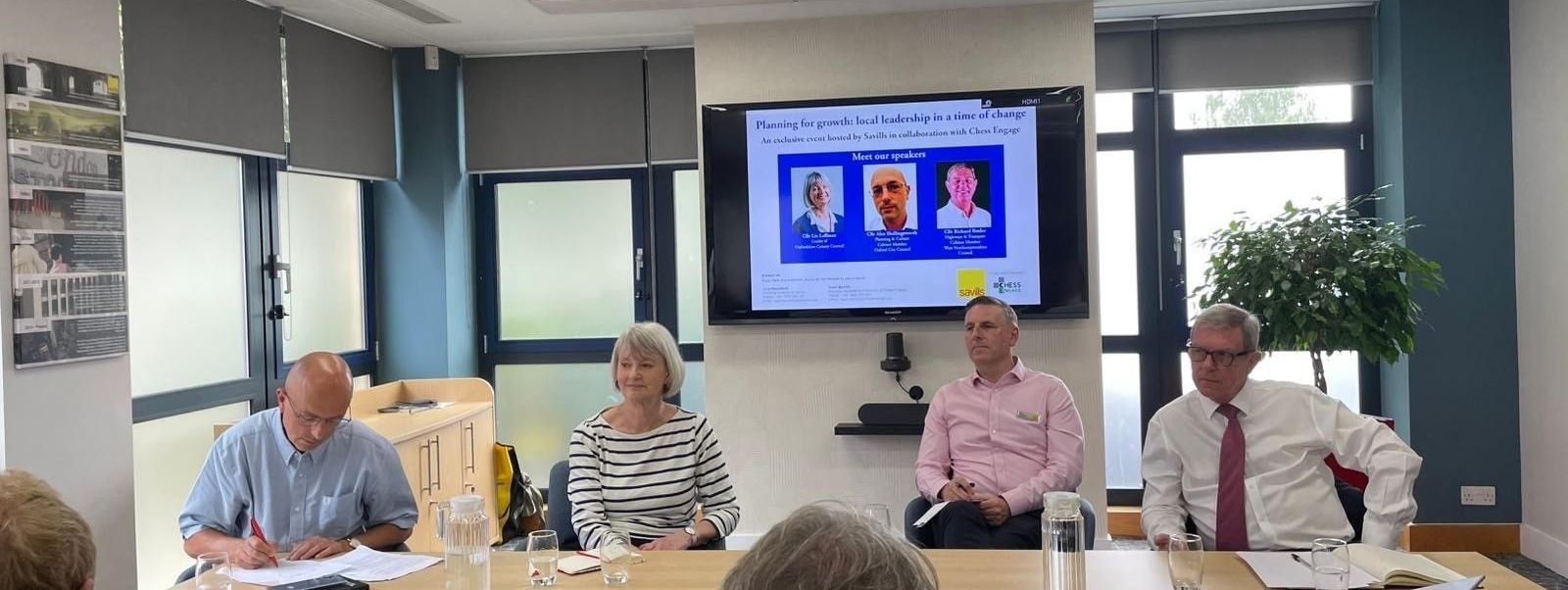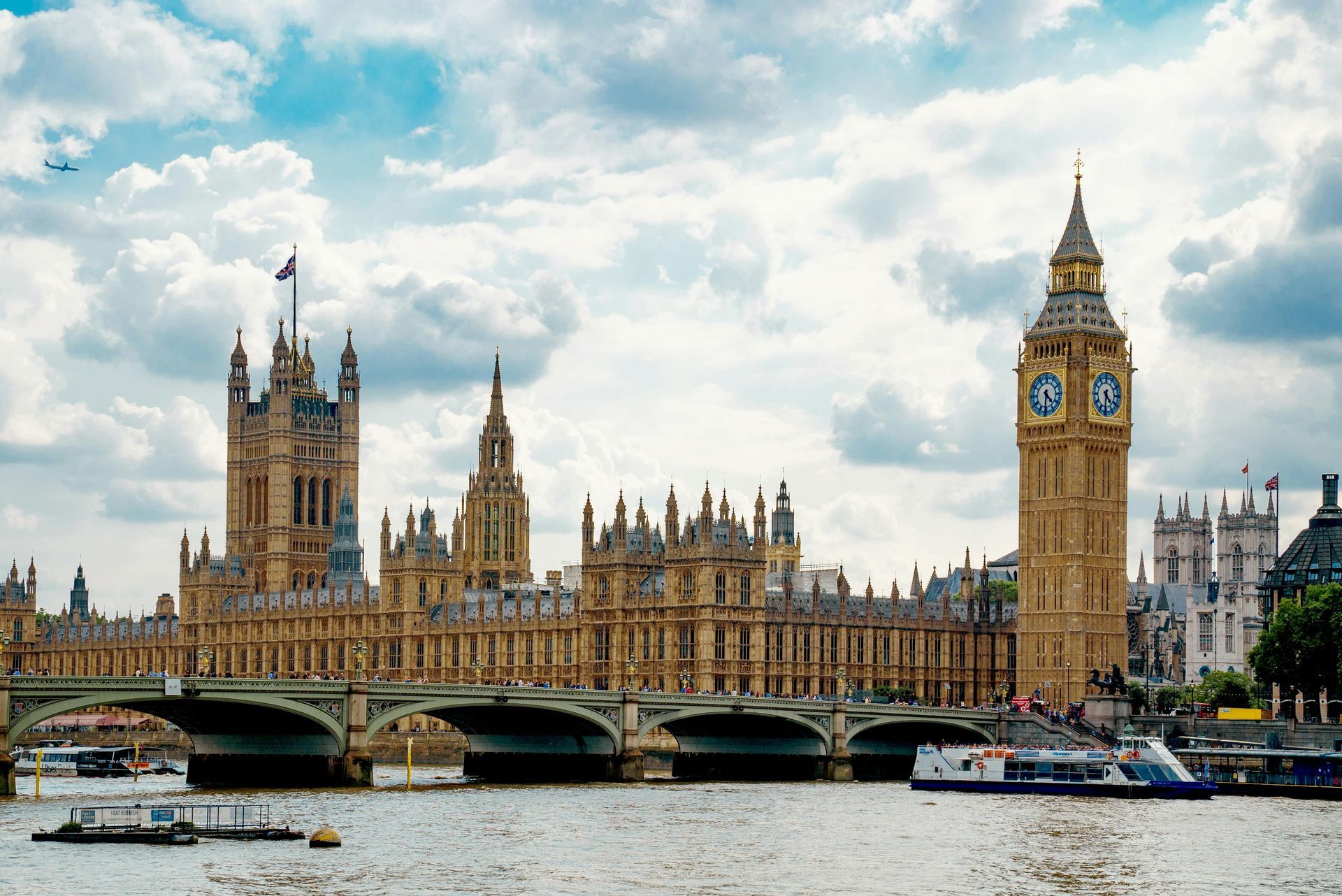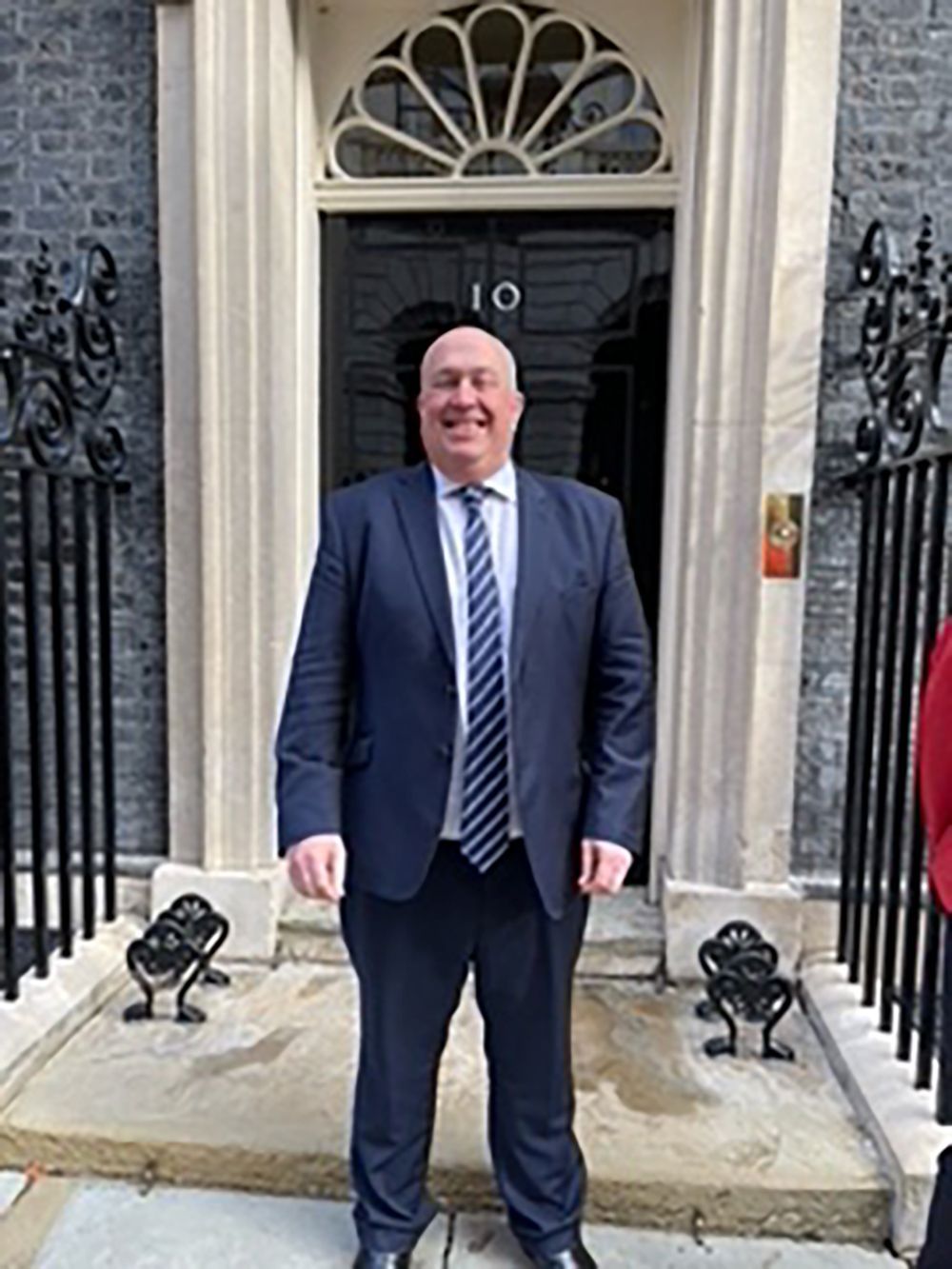Headlines

Last week, Chess Engage was delighted to co-host another engaging and timely event with Savills, bringing together leading voices from across the political spectrum to discuss the future of housing and infrastructure in Oxfordshire and beyond. The panel featured Cllr Liz Leffman (Liberal Democrat), Cllr Alex Hollingsworth (Labour), and Cllr Richard Butler (Reform), who provided valuable insights and—perhaps surprisingly—a strong degree of consensus on some of the region’s most pressing challenges. We Need New Homes All three councillors agreed: the need for more homes is urgent. Demand continues to outstrip supply, placing pressure on families, young people, and key workers alike. Affordability is Key There was a shared recognition that affordability must be central to any future housing strategy. Delivering homes that local people can actually afford to live in is not just a political goal—it's a moral and economic necessity. Infrastructure Must Come Early Critically, the panel highlighted the need for infrastructure to be delivered ahead of development, not as an afterthought. Roads, schools, healthcare, and utilities must keep pace with growth if new communities are to thrive. The event also underscored that the “builders not blockers” message is beginning to resonate, with broad agreement that local authority planning and highways teams need to move faster and more efficiently. Transport and Innovation: A Call from Oxfordshire There was a strong message from Oxfordshire stakeholders about the urgent need to improve transport links across the county. One striking example: researchers moving between Oxfordshire’s leading science and innovation hubs often face the prospect of having to relocate entirely, as current transport options make commuting impractical. Improving connectivity is not just about convenience—it’s about unlocking the full economic potential of the region. Seamless links between research parks, universities, and business centres could drive collaboration and accelerate innovation. As always, we thank Savills and our brilliant panel of speakers for another thought-provoking and productive event. The cross-party agreement we saw is a promising sign that momentum is building—and that, with the right focus and investment, real progress is possible.

Ed Davey prided himself on being the only one; now, after an unorthodox but effective election campaign, his record high cohort of 72 Liberal Democrat MPs contain several who were never on his party’s target seat list. These lists, always kept secret, are dynamic and some of the more surprising wins reportedly received significant support at the last minute. While five of his band are ex-military, more strikingly, 35 of 72 are councillors. Of these, many (such as John Milne in Horsham and Charlie Maynard in Witney) were executive members for planning until a mere week ago. The respected political scientist Rob Ford has characterised the new Parliament as featuring 72 constant NIMBY campaigns against new development plans ( As Rob Ford states the Lib Dems will become the ultra turbo NIMBY party in this Parliament ). Rachel Reeves’ housing announcement will ring alarm bells, particularly for those authorities that were relying on Michael Gove’s relaxation of requirements. In several places, the housebuilding debate will be lively between Lib Dem led councillors and a mix of Labour and Lib Dem MPs; characterising them as ’72 NIMBY campaigns’ may be churlish, but spokesperson Helen Morgan (with a housebuilding background) has a challenge on her hands given the tensions between party policy and local pressures. Having led one of the successful campaigns and knocked on thousands of doors during the campaign, I can confirm the resonance of these issues is real. People want to know why growth has not come with services such as new GP surgeries and health hubs ( As Marie Goldman MP states in her letter to Wes Streeting ); why transport schemes are cancelled or unfinished, and why sewage infrastructure has not kept up. The phenomenally disciplined Lib Dem campaign will have been able to step seamlessly from the more local themes of May to these issues. Equally, though, the new intake will have an eye on maintaining their momentum. May 2025 sees elections to the shire counties; the last redoubt of Tory England. With no timescale as yet for a new Conservative leader to unite a deeply fractured party and hold the new Government to account, an opportunity has been scented. Counties such as Surrey, Hertfordshire, Hampshire and West Sussex are in the party’s sights after the gains recently made. Even the one county to remain in Conservative control in 1993, unitary Buckinghamshire with its size reduced to more modest proportions, may not be out of reach. Several of these authorities are in a parlous financial state; expect to see plenty of pressure on Whitehall, weaponizing the potent issue of the pothole. The delight on the faces of those who clearly did not expect to make it to the Commons has been evident as they’ve queued to be sworn in. Euphoria at the scale of the win will turn quickly to campaigning pressure. Chess can advise those working in what was the ‘Blue Wall’ using our detailed understanding of the dynamics of Lib Dem/Conservative battlegrounds. Please get in touch to find out more.

Angela Rayner - Deputy Prime Minister and Secretary of State for Housing, Communities and Local Government Delivery of Labour’s pledged 1.5 million homes over this parliament sits with Angela Rayner. Her headline announcement of sites for new “towns of the future” to include 40% affordable housing will be revealed by the end of the government’s first year in office and will be eagerly awaited and much scrutinised. This, together with planning reform and the restoration of local authority housing targets Labour say will help deliver the most ambitious programme of housing delivery for a generation. It remains to be seen how rigid housing targets will be reconciled with Rayner’s much heralded new era of devolution. Rayner has recently faced capital gains tax questions over the sale of her Manchester council home, having exercised her Right-To-Buy. While many on the left have a deep distaste for Margaret Thatcher’s flagship policy, as with Blair’s government in 1997, the policy is likely to survive with a reduced level of discount. Rachel Reeves – Chancellor of the Exchequer During the general election, Rachel Reeves would repeat to anyone willing to listen that Labour’s manifesto was fully costed and funded. Cautious over tax policy and spending pledges, she has talked of infrastructure and development led growth as the route to deliver Labour’s plans at a time of acute public spending challenges. As part of what she calls a “national mission,” Reeves is shaping up to take on traditional vested interests having announced the reintroduction of local authority housing targets – as part of sweeping reforms to the planning system. The review of Green Belt in local authority areas and those parts which may be classified as “grey belt” will attract the support of the development industry as well as fierce opposition in local authority areas. Prepare for some pitched battles in parts of the country! Jim McMahon – Minister of State Department of Housing, Communities and Local Government Fresh from surviving a tough election in his Oldham West and Royton constituency, McMahon was quick to announce the end of the term “Levelling Up” in his department and the restoration of its former name reflecting the importance of local government, to end the “gimmicks” of the Boris Johnson era. McMahon describes his politics as being community and co-operative rooted. He advocates resident involvement in running everything from community centres to pubs and vacant retail units. McMahon has announced an end to bidding wars between local authorities and for allocations of funding for housing to be based on need. He has spoken of creating a “partnership of equals” across all tiers of government and political colours, which many will consider easier said than done given the challenges ahead. Matthew Pennycook - Minister for Housing and Planning Matthew Pennycook has a background in local government and has spoken recently of how new compulsory purchase order powers for local authorities, compulsory housing targets and funding for extra planning officers across the country will ease the housing crisis. To some, compulsory purchase is the ultimate in the excesses of heavy handed state power, so some bruising encounters over this can be expected. Pennycook, who with leader Keir Starmer recently announced Labour would build 1.5 million new homes in the course of this parliament, is not unfamiliar with local tensions over housing delivery in his own constituency of Greenwich and Woolwich, where he has recently objected to a high rise development. Reconciling such conflicting pressures across the UK will be among the biggest challenges facing the new government.

Recently, I was one of a small number of senior Conservative activists invited to a breakfast meeting with the Prime Minister at Downing Street. The Prime Minister was interested to hear our views about the issues we face. I spoke about housing as a third-generation homebuilder and someone who has spent 39 years in the industry, from building houses to engaging with communities on new housing, business, and industry development. The Conservative Party faces an existential crisis. For it to be the election-winning machine it has been for much of its existence, it must do one thing above all to win over the electorate—make the modern-day case for capitalism. A key component of this is ensuring that every individual has a physical stake in society. We would argue that the easiest way of achieving this is through bricks and mortar and creating a new ‘property-owning democracy.’ In 2016, just 34% of the adult population aged 16-34 were owner-occupiers [1] . By contrast, in 1995, property ownership for the same age group stood at 54%. So, the question for Government is this: do we move forward and build new housing our communities and residents need, or do we risk alienating an entire generation of aspirant homeowners? The reality is that the Conservative Party has always prospered electorally when it promotes a positive agenda on housing. In 1951, Winston Churchill triumphantly returned to Government on a manifesto of property ownership, and his administration fulfilled its pledge to the electorate to build 300,000 houses a year – a policy overseen by the future Prime Minister, Harold Macmillan. In 1980, it was, of course, Margaret Thatcher who introduced the ‘right to buy’, which increased property ownership by 12 per cent over just three years. So, how do get spades into the ground? There isn’t, of course one silver bullet, but here’s my three-point plan for starters. One – There needs to be a recognition that existing backlogs in the planning application determination process are a barrier to building new homes. a) Planning fees currently set by the Central Government, should be determined by individual local authorities. Currently, these fees do not cover the actual cost of processing applications. For example, in 2020/2021, 305 out of 343 planning departments operated in a deficit cumulatively totalling £245 million. b) Council planning departments also continue to experience recruitment and retention problems due to competition from the private sector. Giving councils the ability to set their planning fees locally would result in the sector being able to compete more effectively on terms and conditions, benefiting local residents. Whilst Chess Engage welcomed recent changes allowing councils to charge increased fees on major applications in exchange for an accelerated decision-making process, we fear that this will exclude local construction firms responsible for smaller-scale development. Developers, whatever their size, are key to tackling the housing shortage. Fully devolving the power to set planning fees to local authorities will speed up the decision-making process for all applications and turbocharge the effort to build more housing without costing the Treasury anything. Two – we need to get Councils building more homes. We know that social housing provides families with a secure environment to live in and can act as a bridge to home ownership. Of course, building new social housing will also help reduce the overall housing shortage and address the homelessness surge we are currently sadly seeing. Research from the LGA indicates that for every £1 invested in social housing, £2.84 is returned to the broader economy. Likewise, for every social home built, the Government can save £780 in housing benefit. To support councils in building more social homes, Government should allow Councils to retain 100% of their right to buy receipts to build social homes to replace those where people have taken the right steps to home ownership. These right-to-buy receipts staying with councils would be a real boost to the ambition of councils to build more social housing and reduce the use of temporary accommodation. Three - local authorities also need the long-term financial sustainability of their Housing Revenue Accounts (HRAs). For this reason, Chess Engage is calling on the Government to allow social housing rents to be set directly by local authorities rather than centrally. Again, this would be at zero cost to the Treasury but would ensure that HRAs have the long-term certainty necessary to deliver more social homes. With this power, councils would also be genuinely accountable to tenants for managing social housing. To tackle the national housing shortage and create the next generation of homeowners, we need to recognise that it is Local Government that can and will deliver sustainable housing to communities across our country. As a longstanding councillor and party activist who has knocked on thousands of doors over the years, I know that most people don’t fear new housing per se, but rather development that is not well designed and which does not come with the necessary infrastructure that is needed to support the additional demand on public services. Will the PM adopt my three-point plan? I do believe that delivering these three quick and easy wins which will boost housing growth and help the next generation of homeowners could be a way forward. In so doing, we will make the contemporary case for capitalism and secure the next generation of Conservative voters. After we’d finished, one of the PM’s policy advisors got in touch to set up a follow up meeting. Watch this space… [1] https://researchbriefings.files.parliament.uk/documents/CBP-7706/CBP-7706.pdf

As one MP recently put it, the Government continues in office with the air of the football fan who arbitrarily declares that Blackburn Rovers are on top of the Premier League with Alan Shearer tearing defences apart with his pace. Meanwhile, reality looms. The giant YouGov/Telegraph MRP poll published on 15 January shows a swathe of red and gold across the map of what has for a century been the truest of blue Conservative heartlands in the Home Counties. Across Berkshire, Oxfordshire, Surrey and into Sussex, polling data predicts the worst possible nightmare for Rishi Sunak. The funders of the poll, nameless Conservative donors, may not have wished for the outcome they got; but they certainly got Tory MPs doing a frantic postcode search. Polls like these tend to downplay the effects of tactical voting; however, even if, as many of us expect, Richard Tice marches his Reform Party candidates to withdraw as in 2019 to minimise Tory discomfort, the situation looks dire for the Tories. The seeds of these results were sown in the post-referendum chaos of 2019. The revival of Lib Dem fortunes that fell flat during a General Election campaign nonetheless revived the party’s local government base in many leafier parts of the South, with concerns about development and sewage often featuring in local campaigns. Housing land supply shortfalls frequently led to particular challenges for a government enabling a “development free-for-all”. As recent Post Office/Horizon scandal coverage has shown, heat can follow news stories particularly fast. Reputation management dictates a need to manage sensitive projects at times when aspiring politicians have an eye for a headline. With boundary changes creating uncertainty, the risk for the industry is that once an issue is seized on, all parties will want to be seen as supporting a local action group or campaign. As the by-election in Chesham and Amersham that coined the “Blue Wall” showed, opponents of change have a broader audience at an election. News recently reached us of a developer pushing ahead with a speculative application in one of the long-shot Lib Dem target constituencies. Music to our ears….. if we were a local Lib Dem election planning team. The natural tension between the populist urge to support local action groups and the shared, cross-party goal to build more homes will only go one way in these largely rural seats. While local opinion is much more balanced than an adrenalin-fuelled activist might acknowledge, we know as campaigners ourselves that in such situations, short-term political drivers hold sway. At Chess, our cross-party political team does more than just banter. We have direct experience of just what local Conservatives are prepared to do to escape their likely fate; and what Lib Dem campaigners are relying on to revive their party. May’s local elections, from a Conservative high water mark, are likely to be a dry run. Our advice now on managing risk is a strategic necessity; knowing when not to do things is important in an election year, and regardless of the colour of my colleagues’ rosettes, the advice we at Chess will give is an essential part of any promotion strategy for 2024.


